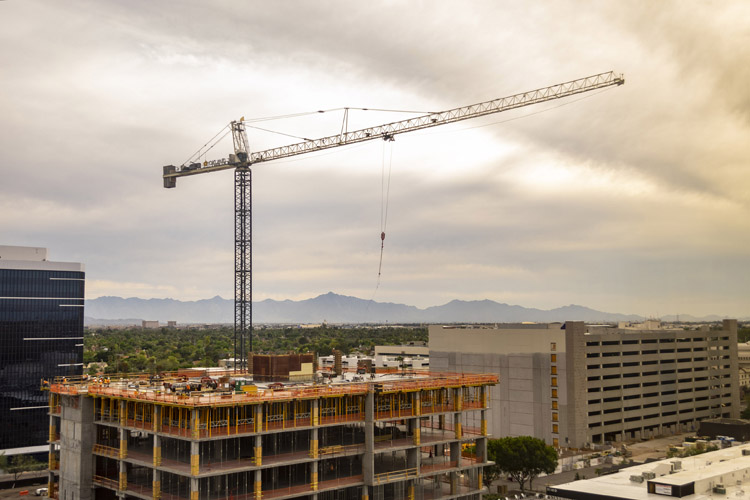The construction industry, a cornerstone of Arizona’s economy, is one of the essential services that can continue operating under Gov. Doug Ducey’s stay-at-home order issued this week.
As signs of distress are emerging for the construction industry as commerce slows, construction advocates are counting on the governor’s order and the nation’s new $2.2 trillion economic stabilization package to help.
“Obviously, public safety is the most important thing and how we support people who are displaced at this time, but we need to focus as well on recovery in an appropriate manner,” said Cheryl Lombard, CEO and president of the non-profit Valley Partnership that represents developers in the Phoenix region.
States, cities open — and closed — for construction
Some municipalities and states like New York and Washington have shut down construction except for critical repairs and projects.
But others like Arizona, California and Illinois, are trying to keep the construction industry alive even under orders to shelter in place or stay at home. Major projects such as the $1.9 billion Allegiant Stadium in Las Vegas, a $1.5 billion expansion of the Kansas City International Airport, and the $4 billion train route from Orlando to West Palm Beach are still on track.
Rigid safety guidelines in place
General contractors already are accustomed to “very rigid” safety standards and have initiated additional protocols during the outbreak, said Suzanne Kinney, president of the Arizona chapter of NAIOP, the voice of commercial real estate.
“They’re doing what they need to keep their workers safe, and what we’re hearing is their workers want to stay on the job and they can do that safely,” Kinney said.
Keeping construction industry going is critical
Industry leaders and advocacy groups like the NAIOP and the U.S. Chamber of Commerce are urging President Donald Trump to keep construction as an essential business nationwide.
Shutting down massive projects midway could put the country in a more dire state.
“Some of these projects are important for our country,” Kinney said. “They’re important in the short term in addressing the crisis, and they’re important in the long term because they’re projects that cannot be quickly closed out and then started again because of their scale.”
As a nation, the U.S. enjoys one of the largest construction markets worldwide. The industry has more than 680,000 employers and over 7 million employees and creates nearly $1.3 trillion worth of structures each year, according to the Associated General Contractors of America.
In Arizona, the industry employs close to 150,000 workers, according to the Arizona Office of Economic Opportunity.
Construction is also one of the largest customers for manufacturing, mining and a variety of services.
Commercial real estate starting to see signs of distress
For now, there have been few major development projects on the chopping block in Arizona because of the virus. But issues are emerging that need quick solutions, Kinney said.
Among them: tenants unable to pay rent, a need for forbearance on mortgages for building owners, and the inability to meet important deadlines because of travel restrictions and social distancing.
Rent payments stalling
Kinney reports seeing daily “exponential” growth of tenants unable to pay rent because of businesses slowing and shutting down.
“Unfortunately, our commercial real estate industry is experiencing quite a bit of pain already,” she said. “One of the main issues is that businesses, particularly smaller or those in restaurant and hospitality, have had such a decrease in their revenues that they are unable to pay their rents.
“There’s zero incentive to push tenants out, but it’s difficult for building owners because they do rely on that rent coming in to pay for building operations, and more importantly, to service their mortgages on their buildings.”
Deadlines impossible to meet
Real estate transactions in many instances are on hold because of travel restrictions. That means it can be impossible to meet deadlines for matters such as 1031 exchanges, Kinney said.
These common exchanges occur in commercial real estate when an investor in a property sells that property and immediately rolls it into another property. In doing so, investors do not have to pay capital gains tax on the gain from the property. Under the virus outbreak, legal deadlines for many of these transactions are impossible to meet.
“Because of this extraordinary situation, the whole process has slowed down and in some cases come to a screeching halt because part of real estate transactions require meetings to take place and tours and inspections of the property,” Kinney said. “But because there’s so many travel restrictions, that simply cannot happen, but the deadlines are still in place at the IRS.”
Solutions on the way
Currently, there are solutions surfacing. A new disaster loan program through the federal Small Business Administration can help small businesses with working capital and other expenses.
The $2.2 trillion economic stabilization package recently passed by Congress should offer some solutions as well, industry advocates said. Included in the package is nearly $350 billion in loans and grant assistance for small businesses with 500 or fewer employees. The forgivable loans can be used for payroll, rent and other operating expenses.
“It should be okay as long as we can just get heard with all of the noise that’s taking place right now,” Kinney said.
For now, all parties are working together, but relief needs to come soon, she said.
Meanwhile, as cities and states issue more social distancing requirements, Gov. Ducey’s essential services order provides certainty for the industry, she said.
“It’s extremely helpful to have that consistency across the state,” Kinney said. “General contractors, developers and construction companies were really confused when we were facing city-by-city closures.”
Governor’s order covers construction, maintenance, landscaping
According to Gov. Ducey’s essential services order, most if not all construction projects can continue including public works projects, long-term care facilities, housing, building maintenance and management, and landscape management.
Resources for the real estate industry
As the virus hampers the ability to meet with some clients or visit a local planning department, the Valley Partnership has compiled a number of resources and links for the industry.
Included are lists how city and county planning and zoning agencies are operating — mostly online — through the outbreak.
“Our members are working on a case-by-case basis with their tenants that are impacted by the crisis,” CEO Lombard said. “We’re asking tenants to contact their landlords. Most important is for everyone to stay healthy.”
This story was originally published at Chamber Business News.




